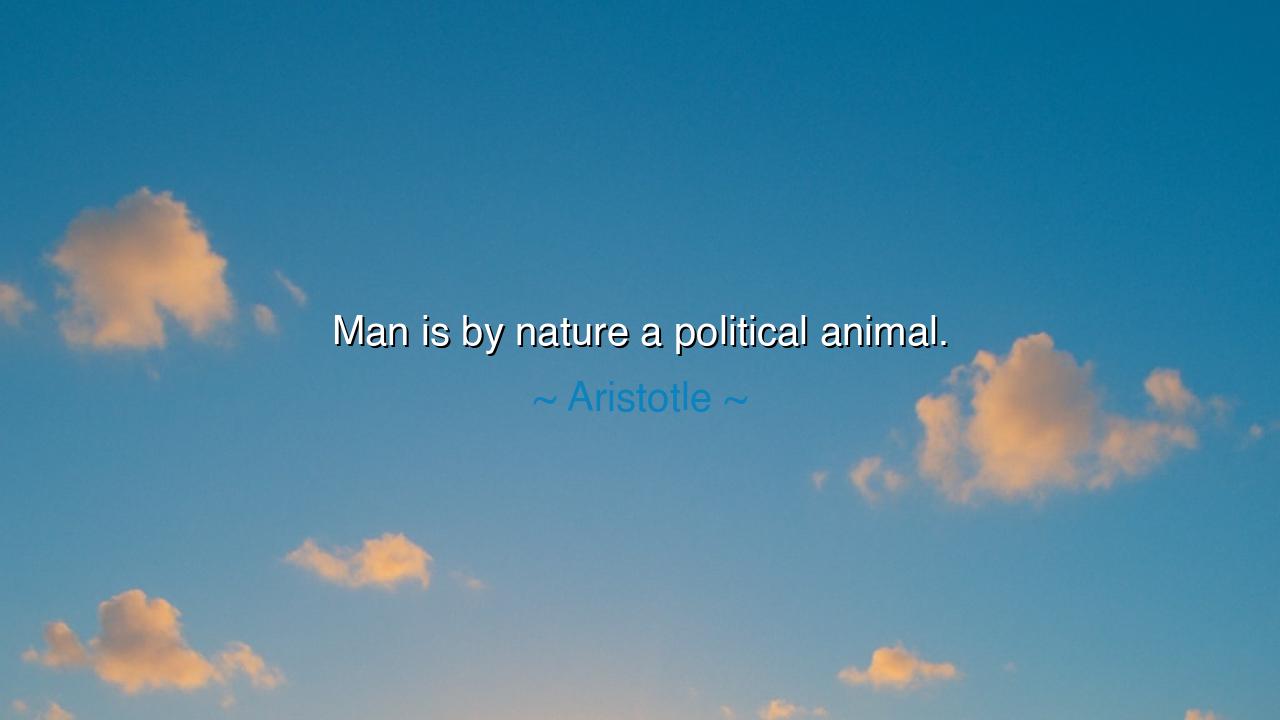
Man is by nature a political animal.






Hear now the wisdom of Aristotle, master of reason and student of the cosmos, who declared with thunderous clarity: “Man is by nature a political animal.” In these few words lies not merely the fate of one city or one age, but the eternal truth of humanity itself. For man is not a beast of the field, content to graze in solitude, nor is he a god who dwells apart, self-sufficient and unmoved. He is a creature of bonds, of speech, of laws, of assemblies. His soul seeks not only bread but fellowship, not only shelter but a polis — a city, a community, a shared life.
To call man a political animal is to say that he finds his fullest self not in isolation, but in the weaving together of lives. Alone, he may survive; together, he may flourish. For the gift of speech is given to reveal not merely pleasure and pain, as the animals do, but justice and injustice, the noble and the base. It is through the polis that man learns to live rightly, to govern his impulses, and to rise beyond the fleeting instincts of hunger and fear. Without the polis, he is either beast or god — beneath humanity or beyond it. Within it, he is truly man.
Think of the tale of Pericles, leader of Athens in her golden age. When the city was besieged by plague, when walls echoed with cries of despair, he did not abandon the people to chaos. He stood before them, not as a solitary figure, but as a voice of the polis itself. He called upon their shared identity, their shared destiny, their shared courage. And though death stalked the streets, the city did not dissolve, for its people remembered they were bound together in more than misfortune — they were Athenians, citizens of a common life. Here the truth of Aristotle’s words shines: man, in the face of ruin, turns to the polis to endure.
Yet this truth is not bound to Athens, nor to the dust of antiquity. Look to our own age: the solitary man, cut off from community, drifts into despair. But those who join in common cause, whether in the building of nations or the small assemblies of neighbors, find strength greater than their own. Consider the birth of the United States, when men of differing colonies and interests gathered in Philadelphia. Had they stood apart, they would have been crushed beneath the crown of Britain. But bound as one body, one polis, they declared independence, and their unity forged a new world.
The lesson, O seekers, is this: never believe the lie that man can live as an island. The soul that flees fellowship shrinks into emptiness. The heart that denies the polis grows cold and bitter. But the one who embraces community, who labors for justice within it, who speaks truth not for himself alone but for the common good — such a one becomes fully human, fully alive, radiant as a citizen of the world.
Therefore, let us practice these actions: Seek out the councils of your city, the gatherings of your people, whether in the halls of governance or the humble spaces of community. Speak not only for your own gain, but for the good of all. Ask in every choice: Does this bind us closer, or does it tear us apart? Honor the duties of citizenship — to vote, to serve, to deliberate, to care for the weak. For in fulfilling these, you fulfill your nature.
Remember, children of the future, that politics is not a word of corruption or strife, but of essence, of destiny. To live as a political animal is to honor the gift of speech, of justice, of shared destiny. You are not made for solitude but for the chorus of many voices. Live, then, as Aristotle taught: not as a beast, not as a god, but as a citizen, a human being in the fullness of his nature.
So I tell you: embrace your polis, love your polis, shape your polis — for in doing so, you shape yourself.






AAdministratorAdministrator
Welcome, honored guests. Please leave a comment, we will respond soon